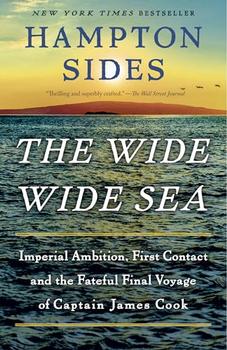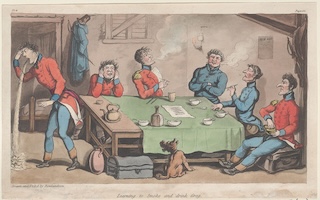Summary | Excerpt | Reading Guide | Reviews | Beyond the Book | Read-Alikes | Genres & Themes | Author Bio

Imperial Ambition, First Contact and the Fateful Final Voyage of Captain James Cook
by Hampton SidesThis article relates to The Wide Wide Sea
 Hampton Sides' book The Wide Wide Sea records the third and final voyage of Captain James Cook and relays some of the exploits of his crew aboard the HMS Resolution. One of Cook's key decisions concerned an alcoholic drink known as "grog."
Hampton Sides' book The Wide Wide Sea records the third and final voyage of Captain James Cook and relays some of the exploits of his crew aboard the HMS Resolution. One of Cook's key decisions concerned an alcoholic drink known as "grog."
During the Age of Exploration—the 15th to 18th centuries—Royal Navy ships would leave English harbors to sail to unknown lands. No one knew how long ships might be at sea before they would reach a location where they might re-stock their provisions. The food situation was quickly figured out; the vessels were outfitted with items that wouldn't spoil quickly (like hardtack, a sort of dense biscuit), supplemented with animals brought along for the purpose.
Water was more of an issue. They couldn't drink salt water, so they had to bring along many casks of liquid for the crew—a ration of one gallon per day per crewman. (For reference, Cook's Resolution set sail with 118 men on board). Originally regular water was stocked, but it became apparent that this wouldn't work for longer voyages, as over time algae made the beverage slimy and unpalatable. Cutting the water with a bit of weak beer didn't work much better because the concoction went sour. They eventually settled on combining the water with brandy or wine.
All this changed in 1655, when William Penn Sr. (father of the William Penn who founded Philadelphia) captured Jamaica from the Spanish. The island's alcohol was rum (fermented sugarcane); with no brandy or other spirit available, Penn's crew used rum to supplement the ship's stores. Unfortunately, it was much stronger than the mixtures the mariners had become accustomed to, and disciplinary problems ensued.
In 1740, Vice Admiral Edward Vernon issued Captain's Order No. 349, which advised those in command of Royal Navy vessels to cut their rum with water (why it took nearly 100 years to regulate this, no one knows). He also had sugar and lime added to the mix; the lime improved taste but also helped with scurvy, a vitamin C deficiency that, left untreated, could lead to death. Vernon's nickname was "Old Grog" because he often wore a coat of grogam—a heavy silk/mohair/wool blend—and so the new drink was christened "grog."
The mix quickly caught on throughout the Royal Navy, although each ship had its own version. Generally the ratio was four parts water to one part rum, but some did 3:1 or 5:1. Mariners referred to the combination by compass points, where North meant pure rum, West pure water—so WNW meant a 50/50 blend. Officers were permitted to take their rum "neat"—i.e., with no water mixed in. By regulation grog was doled out twice a day with great ceremony, and each sailor had to drink it immediately and under supervision. It was a punishable offence to save up one's ration or sell it to another. If a man didn't want his grog he was compensated three pence per day.
In 1805 grog also became known as "Nelson's Blood." After Lord Nelson was killed at Trafalgar, his body was preserved in a barrel of the stuff. Legend has it the sailors actually drank the rum in tribute once Nelson's body was removed.
The United States Navy had its own version of the alcoholic ration, made from rye whiskey rather than rum and named "Bob Smith" (after Robert Smith, the Secretary of the Navy at the time the custom was established). The US ended the practice in 1862, though the Royal Navy held onto the tradition until 1970.
In 1979, an American sailor named Charles Tobias convinced the Admiralty to give him the formula for grog and grant permission for him to bottle it. The product, called Prusser's Rum, is still available today, and royalties from each case sold go to the Royal Navy Sailor's Fund.
Grog Recipe:
Learning to Smoke and Drink Grog, etching by Thomas Rowlandson, 1815, courtesy of Metropolitan Museum of Art
Filed under Cultural Curiosities
![]() This "beyond the book article" relates to The Wide Wide Sea. It originally ran in April 2024 and has been updated for the
May 2025 paperback edition.
Go to magazine.
This "beyond the book article" relates to The Wide Wide Sea. It originally ran in April 2024 and has been updated for the
May 2025 paperback edition.
Go to magazine.
Your guide toexceptional books
BookBrowse seeks out and recommends the best in contemporary fiction and nonfiction—books that not only engage and entertain but also deepen our understanding of ourselves and the world around us.